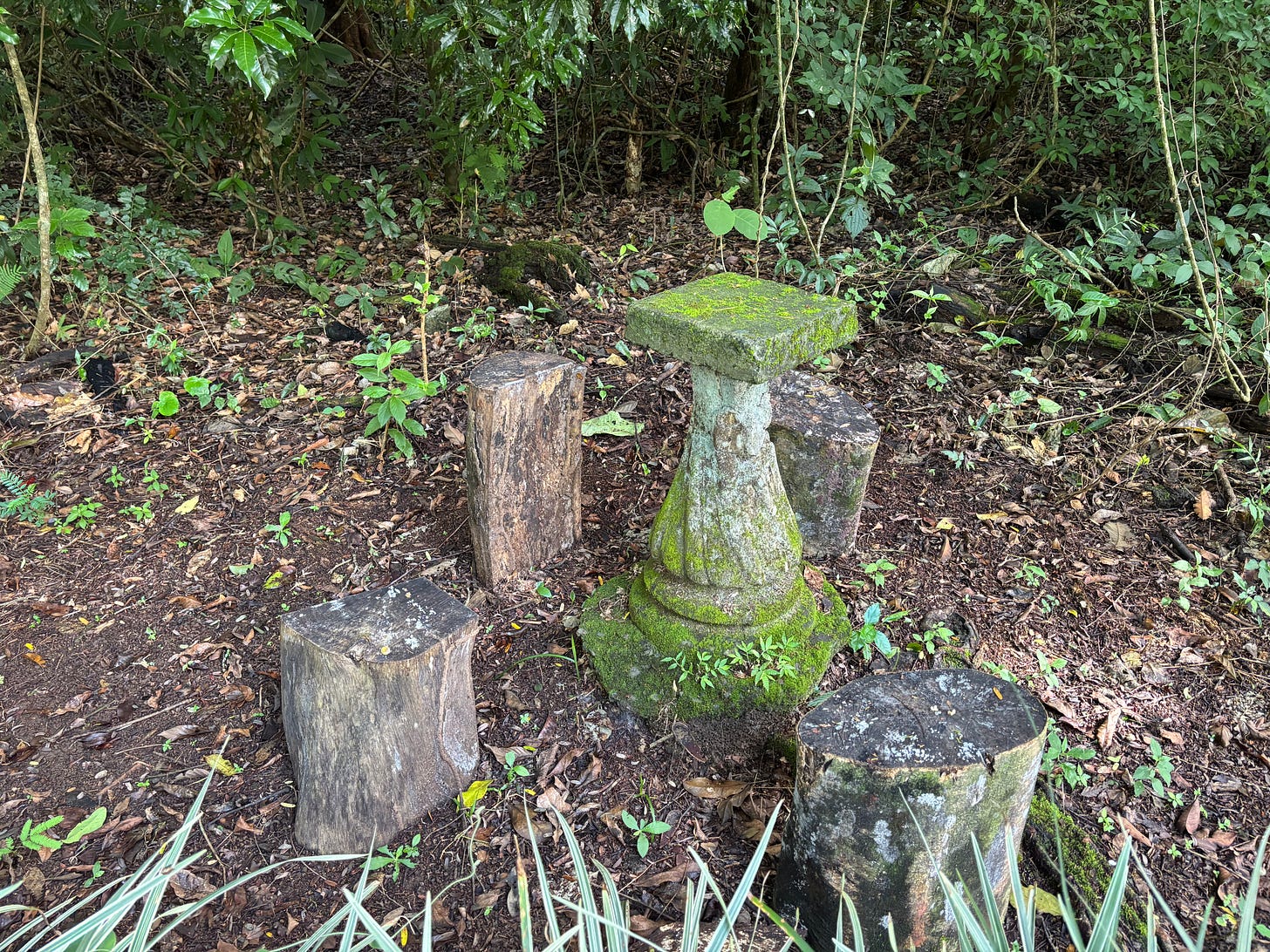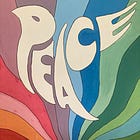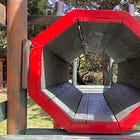Dear beloved community of readers,
In honor of the start of the academic year, I want to offer you a song, recorded on my phone in my stairwell…
This week we started the academic year at UPEACE, my fourth year teaching here. This is the song I always start the school year with, the absolutely sweet perfection of the White Stripes (song title: “We Are Gonna Be Friends”) that captures the beauty, freshness, innocence, excitement, and anticipation of the start of a new school year - especially that of the new relationships we form. It is my deepest hope that amidst our academic engagements across campus, that we become friends, that we weave beloved community together.
Not everyone is going to be best friends, but might we make space for each other to show up as we are, to offer what we can? I was recently introduced to the philosophy of Canadian physicist Ursula Franklin1, whose earthworm theory of social change has been resonating deeply with me. Her idea is that we transform the world like earthworms, slowly preparing the soil for new seeds to take root. Down the (internet) earthworm hole I went, and I came across this quote from Ursula, who was also a peace activist:
“The dream of a peaceful society to me is still the dream of a potluck supper. The society in which all can contribute and all can find friendship. Peace is not the absence of war but the presence of justice and the absence of fear.”
-Urusla Franklin
It is the spirit in which I hope we enter the academic year - bringing our dreams, our wounds, our questions, our experiences to the learning potluck, sharing our contributions, and finding friendship. Education is also the work of earthworming - the slow work of preparing the soil for seed that might take root far in the distant future. It is not sexy or glamorous work, that of the earthworm - but it is the work I love most deeply, and today I give immense thanks to all of the conditions that allow me to be here, starting another year.
I arrived to my office after a week of not coming to campus - part vacation and part just working from home. I sat down at my desk, surrounded by gifts and notes and treasures from students of past cohorts, imagining what kinds of treasures this year’s cohort is bringing with them, as them. I walked into the peace park to connect with the forest, to ask the forest what I should be teaching and writing and saying and creating this year, to ask for their support and offer my commitment to collaboration with the immense web of life we are embedded in up here in our astoundingly gorgeous campus.
As I walked, memories came twinkling back - not flooding; much more gentle than that. Not like ghosts; very much alive. Moments I have spent with students and colleagues over the past three years in this treasured forest. Casting spells around the pedestal altar, Zapatista story time with nonviolence class around the campfire circle, forest clean-ups and walks with peace ed. Intentions and questions and things we wanted to let go of, ripped up and burned and returned to the rich rainforest soil to compost amidst the fungus and leafcutter ants and deep roots.

I wish to root even more deeply into my heart, longing, desires, teaching, and vocation, and even more into the magic and enchantment of learning together. As one of last year’s students said to me, “Let the magic come alive!”2
When I look back at the past three years, that is perhaps the word that best describes what we do here: we make magic together. One of my teachers, Starhawk, describes magic as “the act of changing consciousness at will.” It is about actively shifting one’s inner state in order to shift the world around you. Peace education is about changing the world, and it is about changing our minds - and that these are not separate endeavors. “Peace in oneself, peace in the world,” as my teacher Thich Nhat Hanh says. “Change yourself to change the world,” as Grace Lee Boggs said.
“Magic is merely the mind’s attempt to wrap itself around the impossible,” says Madame Morrible in the movie Wicked. Looking around at the world as it is in this moment, change feels impossible. Evil forces - I hesitate to sound too dramatic here, but the description feels apt - are wreaking havoc and causing harm and destruction nearly everywhere we turn.
“We need to trust the invisible to make the impossible possible when we are working in an entangled way,” Vanessa Machado de Oliveira, of the Gesturing Towards Decolonial Futures Collective, says. What we need to do here feels impossible — and yet, we have to do it, and we have to learn to trust.
As the academic year starts, I commit to trusting the invisible.
I commit to making the impossible possible, here and beyond.
I commit to being present to the magic, and letting the unique form of learning and unlearning and healing and unraveling and re-raveling that we will do together this year unfold, in its own way, on its own time.
I celebrate many new years throughout the year: the calendar new year, the spring equinox/astrological new year, my birthday, and the start of the academic new year. Each one is slightly different, a different reflection point - this one, focused much more on my work, what I bring into the world, how I engage with students, my vocation. Each new year is a chance to reflect on this new beginning, to set intentions and commitments, and to dream into my greatest hopes for the coming year.
The past three years have been so rich and so beautiful, it is hard for me to dream beyond them. Yet I think one of the great themes of my life in my mid-40s is even more: lean even more into pedagogies of possibility, of reaching beyond what feels possible. Do what I am already doing even more. Be who I am, even more.
Last year, I began the academic year with dengue, the season of shedding my skin. The dengue symptoms lasted for months, the last of which was shedding hair.
A fun thing is happening now: the lost dengue hair is growing back, and I’ve noticed these little 4-inch length wisps - which tracks perfectly for growing about a half an inch a month for 8 or 9 months, since November (which was the peak of the hair loss). They have become a halo around my head, which was very much accentuated by a recent boat trip on the humid Carribean coast. Fun :)
I am renenerating, and if you have been around a while you know I write a lot over here about regeneration3, and I am delighting in this embodied experience. I am starting this year with regeneration literally sprouting from my head! And I am grateful to have made a full recovery, to begin the year with this fresh halo, grateful for the gift of starting this new year in health, recovering, regrowing.
I am starting the year reading- hot-off-the presses! - Outgrowing Modernity, the latest from Vanessa Machado de Oliveira of the Gesturing Towards Decolonial Futures collective. I plan to host a slow study group around this book next year, so get your copy and prepare to study together in 2026! In the meantime, you can join me for a slow study of Sophie Strand’s The Body Is a Doorway at the end of the month!
Register here.
Outgrowing Modernity begins by situating our current challenges as fundamentally a problem with education. Vanessa Machado de Oliveira writes:
“Following the book Hospicing Modernity (2021), Outgrowing Modernity argues that the deepest challenges humanity faces today are not primarily technical or informational; they are cultural, affective, and relational. If modern cultures fail to ‘grow up’ in time, prompting a significant shift in collective consciousness and behavior, humanity will remain on a slow-motion path toward premature mass extinction and accelerate the extinction of countless other species.
Growing up as a culture is fundamentally an educational challenge, one that modern education has largely failed to confront. In fact, in many ways, it has done the opposite by encouraging irresponsibility and neglect through rewarding immaturity.”
This is a helpful reminder as to why I am here - that, as Paulo Freire has said, education either serves to uphold the status quo or contributes towards liberation, and in peace education, we are seeking to learn and unlearn towards the latter, in the direction of healing and transformation. We prepare the soil for these seeds of education to take root, for other ways of being and relating to become possible. To paraphrase bell hooks, the classroom remains a space of radical possibility (one of my favorite back-to-school rituals is to reroot myself in some of my favorite writers like Freire and hooks - more on that in this post from last year :).
For those of you returning to school in some shape or form (as students, parents, teachers, etc.), what are your new year aspirations and intentions? What are your hopes and dreams for the coming year? What are the questions and hesitations you are carrying with you? What are your desires and longings? Whether you are starting a new school year or not, if you grew up on the September to June school calendar, this time of year likely feels like a new year to you, too. It is funny and interesting how those rhythms get woven into us long after we may have left those systems (but maybe you’re like me and have never left!).
If you are seeking additional back-to-school inspiration, I invite you to visit my past posts (which I found myself returning to and was grateful for!):
May every classroom be a site of radical possibility, and may we reach beyond the confines of classroom walls and let learning come alive, with the infinite magic and possibility beyond what we can imagine.
With love and care and wishes for a happy year,
Stephanie
Thank you, Hannah! :)
Thank you, Carsten! :)
Including my most recently co-authored academic article: https://openjournals.utoledo.edu/index.php/infactispax/article/view/1630







